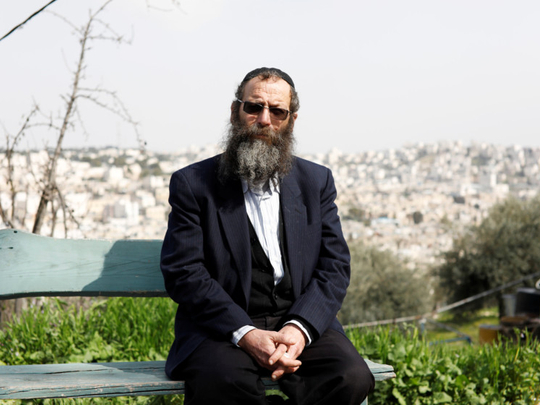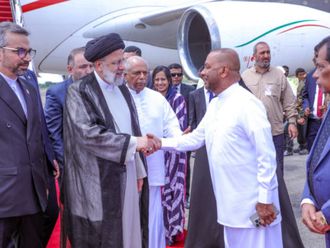
Occupied Jerusalem: Prime Minister Benjamin Netanyahu has made something of an art form of cutting deals with small Israeli political parties, but his latest alliance has earned him denunciations from quarters where he has usually been able to count on unshakable support.
Netanyahu, his future imperiled by prosecutors and political challengers alike, has enraged Jewish leaders in Israel and the United States by striking a bargain with a racist anti-Palestinian party whose ideology was likened by one influential rabbi to Nazism.
Even pro-Israel groups in the United States that prefer to air their disagreements quietly have issued public condemnations.
The embattled Netanyahu, grasping for every potential vote, has turned to the extremist party Otzma Yehudit, or Jewish Power, whose leaders have a long history of expressing support for violence against Palestinians, expulsion of Palestinians from Israel and the occupied territories, and a ban on intermarriage or sex between Jews and Palestinians.
The prime minister arranged for the organisation to merge into a somewhat more mainstream party of religious Zionists, the Jewish Home.
That pact, announced last week, could easily catapult Otzma Yehudit from the disreputable fringe into Israel’s next governing coalition.
Otzma Yehudit’s leaders proudly call themselves disciples of Meir Kahane, the New York City-born anti-Palestinian militant who served a term in Israel’s parliament in the 1980s before his Kach party was outlawed in Israel and declared a terrorist group by the United States. He was assassinated in 1990.
Call to expel Palestinians
Much as Kach did, Otzma Yehudit’s platform calls for annexing the occupied territories, rejecting a Palestinian state, expelling “enemies” of Israel - a euphemism for Palestinians - and taking “ownership” of Al Haram Al Sharif, the third holiest site in Islam.
The site, in Occupied Jerusalem, is overseen by Muslim clerics under Jordanian supervision.
The pact between Netanyahu and the Kahanists set off a predictable eruption from liberal Jewish groups like J Street and Americans for Peace, as well as the Union of Reform Judaism, which normally stays out of Israeli politics.
But the outrage was not limited to the left.
On Friday, the American Israel Public Affairs Committee, the American lobbying group known as AIPAC, and the American Jewish Committee, both of which rarely weigh in publicly on Israeli politics, declared Otzma Yehudit’s ideas “reprehensible.”
They vowed not to have any contact with its leaders even if they become part of the next government.
In an equally extraordinary step, Rabbi Benny Lau of Occupied Jerusalem, a pillar of religious Zionism, repeatedly assailed the merger over the weekend, warning on social media that “the defilement and destruction of the land serves as a guarantee for the loss of the land.”
Lau lamented that the prime minister seemed concerned only with winning re-election, and, from his pulpit at the Rambam Synagogue, likened Kahanism to Nazism and its ideas to the Nuremberg Laws.
“The entry of the racist doctrine into the Knesset is the destruction of the Temple,” he wrote on Facebook on Sunday.
In Israel’s chaotic parliamentary system, small parties, like the ultra-Orthodox Shas, can be essential when it comes to forming a majority coalition after an election, and Netanyahu has routinely struck deals giving them outsize influence.
But this time, he is running with his indictment on corruption charges widely expected, and facing his toughest challenge yet from Benny Gantz, a centrist and popular former army chief.
So desperate to prevent any right-wing ballots from being squandered on a party unable to win its own seats in the Knesset, Netanyahu has pre-emptively stretched his coalition’s margins farther to the right than ever before.
Extremist ideology
The two leaders of Otzma Yehudit who could win Knesset seats, depending on the merged party’s share of the vote in April, are Michael Ben Ari and Itamar Ben Gvir. They are co-founders of Lehava, a group that opposes Jewish-Palestinian relationships and was implicated in a 2014 arson attack on a school for Jewish and Palestinian children in Occupied Jerusalem.
Ben Ari calls Palestinians the “enemy” and advocates expelling them. He was denied a visa to the United States in 2012 as a member of a terrorist organisation.
Ben Gvir, who was a legislative aide for Ben Ari, has acknowledged having a picture in his home of Baruch Goldstein, the Kahane follower who massacred 29 Palestinians while they were praying at a mosque in Hebron in 1994.
He first gained notoriety in 1995, as a radical opponent of the Oslo peace process, when he stole the hood ornament from Prime Minister Yitzhak Rabin’s car and said, “We got to his car, and we’ll get to him, too.” Weeks later, Rabin was assassinated by a member of a group that also had roots in Kahanism.












